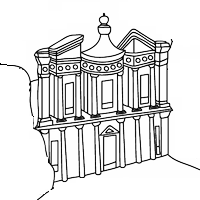As a grandson of Chandragupta and son of Bindusara of the Maurya dynasty, Ashoka was born in 273 (?) BC. At the death of his father, and after the mysterious deaths of his brothers, Ashoka was appointed in 268 To ascend the throne of what is then the most important empire of India. The capital is Patalipura (now Patna).

La colonne d'Ashoka
Ashoka is very early known for its severity. He promulgated very repressive laws and showed himself more and more bellicose towards the neighboring kingdoms. Eight years after his accession to power he decided to attack the kingdom of Kalinga (Orissa). Ashoka's victory is quick but terribly bloody. The emperor witnessed the deaths of thousands of soldiers and this vision deeply shook him. He converts to Buddhism and swears that he will no longer wage war.
Very religious, he draws inspiration from the Buddha's teachings for his new laws, which he makes known to the population by having dozens of columns on which he has his edicts engraved in the common language. Some of these columns are still visible and the capital, often consisting of four lions observing the cardinal points, served as a model for the emblem of the Indian Republic. Ashoka will have a considerable influence on the development of Buddhism in Asia.
He has built thousands of stupas so much so that at the end of his reign the Buddhist religion will be dominant in India. In the meantime he was called "Devanamaprya Priyadarshi", which means "He who is loved by the gods and brings joy." He died in 232 (?) Before Christ.
See also:




















